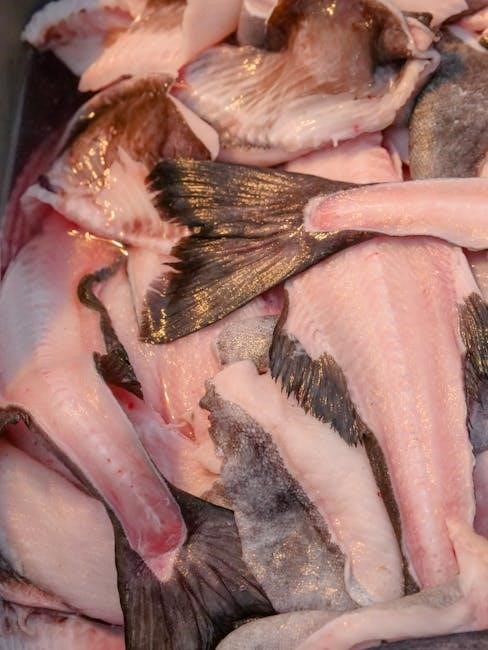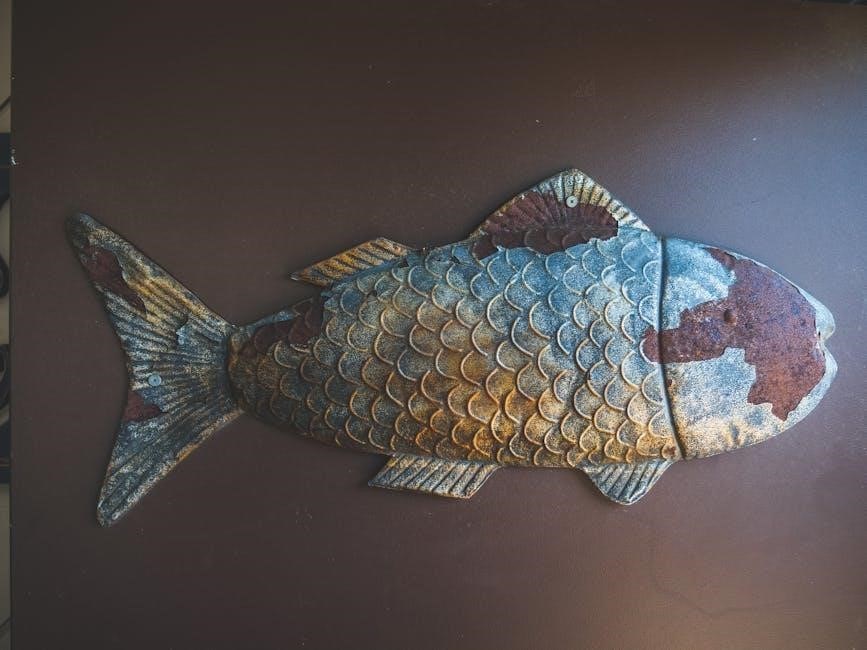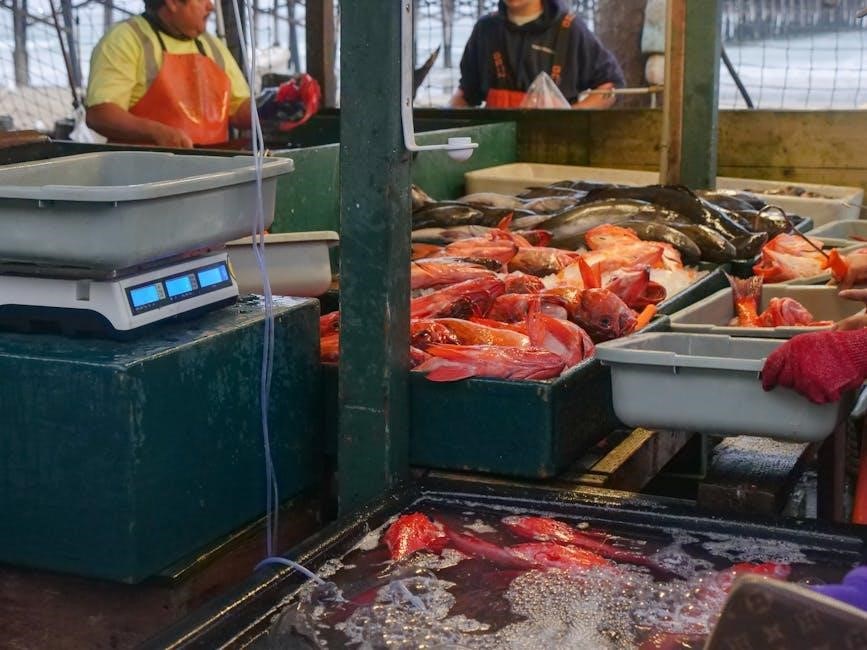The 2024 Food Fishery in Newfoundland and Labrador offers a 39-day recreational groundfish season‚ promoting food security and community engagement without licence or tag requirements.
Overview of the 2024 Schedule
The 2024 Food Fishery in Newfoundland and Labrador features a 39-day recreational groundfish season‚ open every Saturday from June 15 to October 26. This schedule aims to balance accessibility for participants while ensuring conservation efforts. The fishery operates without licence or tag requirements‚ simplifying participation for residents and visitors. Key dates and management measures align with the Fisheries Management Plan‚ ensuring sustainable practices and equitable access to this vital resource for food security and community engagement.
Importance of the Food Fishery in NL
The 2024 Food Fishery plays a vital role in Newfoundland and Labrador‚ supporting food security and community well-being. It provides a sustainable source of fresh seafood‚ supplementing household food supplies while fostering cultural traditions. The fishery also promotes community engagement and offers economic benefits through local tourism and informal markets. By ensuring equitable access to this resource‚ it strengthens social bonds and contributes to the province’s food sovereignty and cultural heritage‚ making it a cornerstone of coastal communities.

Key Regulations for the 2024 Season
The 2024 season requires adherence to a 39-day recreational groundfish fishery schedule‚ with no licence or tag mandates‚ ensuring accessible participation while maintaining resource sustainability.
Recreational Groundfish Fishery Details
The 2024 recreational groundfish fishery in Newfoundland and Labrador is scheduled for 39 days‚ opening every Saturday. No licence or tags are required for participation. The fishery allows individuals to harvest groundfish for personal consumption‚ with a maximum boat limit of 15 groundfish when three or more people are fishing. This initiative supports food security while promoting sustainable fishing practices. It is designed to provide accessible opportunities for residents to engage in traditional fishing activities responsibly.
Licensing and Tag Requirements
For the 2024 recreational groundfish fishery in Newfoundland and Labrador‚ no licence or tags are required for participation. This simplified access aims to encourage community involvement and food security. However‚ commercial fisheries must adhere to specific licensing and tagging regulations to ensure compliance with conservation efforts. The lack of requirements for recreational fishing promotes ease of access while maintaining responsible fishing practices. This approach balances accessibility with sustainability goals for the region’s marine resources.

Management Measures and Conservation Efforts
Conservation efforts in 2024 focus on sustainable practices‚ guided by the IFMP‚ ensuring responsible fishing and protecting marine resources for future generations.
Fleet-Specific Management for Commercial Fisheries
Fleet-specific management for commercial fisheries in 2024 focuses on targeted measures to ensure sustainable practices. The IFMP guides these efforts‚ particularly for the 3Ps cod fishery‚ emphasizing monitoring and enforcement. Vessels are subject to catch limits and gear restrictions to prevent overfishing. These measures aim to rebuild fish stocks and promote long-term sustainability‚ balancing economic needs with environmental protection. Regular assessments ensure adherence to conservation goals‚ supporting both the industry and marine ecosystems.
Role of the Fisheries Management Plan (IFMP)
The IFMP plays a crucial role in guiding the 2024 food fishery‚ ensuring sustainable practices and conservation. It outlines catch limits‚ monitoring strategies‚ and rebuilding plans for key species like cod. The plan integrates scientific research with stakeholder input‚ balancing ecological and economic needs. By adhering to the IFMP‚ the fishery aims to maintain healthy fish populations and support long-term food security for Newfoundland and Labrador communities.

Key Species and Fishing Areas
Primary species include groundfish and cod‚ with fishing areas spanning NAFO divisions and specific rivers like Salmon River and Shoal Harbour River.
Groundfish and Cod Fisheries
The 2024 recreational groundfish fishery focuses on cod and other groundfish species‚ with a 39-day season open to residents and visitors. Key management measures include catch limits and gear restrictions to ensure sustainability.
The fishery is guided by the Integrated Fisheries Management Plan (IFMP)‚ which outlines conservation efforts and rebuilding plans for cod stocks. Maximum boat limits of 15 groundfish apply when three or more people are fishing.
Salmon and Trout Fishing Regulations
The 2024 salmon and trout fishery in Newfoundland and Labrador is regulated to ensure sustainable practices. Anglers must use artificial flies on scheduled salmon waters‚ with only one hook permitted. Specific closures in NAFO divisions and river systems may apply to protect vulnerable stocks. Conservation efforts focus on rebuilding populations while allowing recreational access. The fishery management plan (IFMP) guides these regulations to balance recreational and commercial interests effectively.
Fishery Closures and Restrictions
Fishery closures in specific NAFO divisions are implemented to protect vulnerable stocks and ensure sustainability. Restrictions are based on conservation needs and fish population health.
Specific Closures in NAFO Divisions
In 2024‚ specific closures were implemented in NAFO Division 3L‚ particularly in Herring Fishing Area 6‚ to protect vulnerable fish stocks. These closures aim to conserve herring populations‚ which are crucial for the marine ecosystem. While the recreational groundfish fishery remains open for 39 days‚ these targeted restrictions ensure long-term sustainability. The closures are part of broader conservation efforts to prevent overexploitation and maintain balanced fish populations in key fishing areas.
Reasons for Closures and Restrictions
Closures and restrictions in the 2024 food fishery are primarily aimed at conserving fish stocks and ensuring sustainability. Specific closures in NAFO Division 3L‚ particularly in Herring Fishing Area 6‚ were implemented to prevent overexploitation. These measures protect vulnerable species and maintain ecosystem balance. Additionally‚ restrictions help combat illegal activities‚ such as black-market fishing‚ ensuring the fishery remains a legitimate and sustainable resource for both recreational and commercial users.

Sustainability and Food Security
The 2024 food fishery aligns with sustainable practices‚ ensuring responsible harvesting to maintain fish stocks. It supports food security by providing a reliable source of fresh seafood.
Best Practices for Sustainable Fishing
Adhering to catch limits and avoiding sensitive habitats are crucial for sustainable fishing. Proper gear use‚ timely release of undersized fish‚ and minimizing bycatch help conserve stocks. Monitoring fishing efforts ensures compliance with regulations. Educating anglers about responsible practices promotes long-term fishery health. Implementing these measures supports the rebuilding of fish populations and maintains the balance of marine ecosystems for future generations.
Challenges in Maintaining Food Fishery Resources
Ensuring the sustainability of the food fishery faces challenges like illegal fishing activities and overexploitation. Monitoring compliance with catch limits and gear restrictions is difficult. Climate change impacts fish stocks‚ requiring adaptive management. Balancing recreational and commercial interests adds complexity. Additionally‚ managing the black-market sale of catches and educating anglers on responsible practices remain significant hurdles in preserving fishery resources for future generations.
Recreational vs. Commercial Fisheries
Recreational fisheries focus on personal use and community engagement‚ while commercial fisheries prioritize economic production. Recreational groundfish fishery requires no licence in 2024‚ unlike commercial operations.
Differences in Regulations and Practices
The recreational fishery operates without licence or tag requirements‚ focusing on personal use‚ while commercial fisheries adhere to strict IFMP guidelines and TAC limits. Recreational fishing promotes community engagement‚ whereas commercial fishing prioritizes economic production. Management measures differ‚ with recreational fisheries open for 39 days in 2024‚ and commercial fisheries subject to fleet-specific regulations. These distinctions ensure sustainability and equitable resource distribution‚ balancing food security with economic needs.
Impact on Local Communities
The 2024 Food Fishery plays a vital role in supporting local economies and fostering community traditions. It provides direct access to fresh seafood‚ enhancing food security and supporting local markets. Recreational fishing encourages social engagement and cultural preservation‚ particularly in coastal areas. Commercial fisheries contribute to employment and economic stability‚ ensuring sustainable livelihoods. These initiatives strengthen community bonds and promote a shared connection to marine resources‚ highlighting the fishery’s significance beyond mere resource extraction.
Future Outlook and Community Support
The 2024 Food Fishery sets the stage for sustainable practices in 2025 and beyond‚ fostering community-driven initiatives and collaboration among stakeholders to ensure resource stewardship.
Plans for 2025 and Beyond
The 2025 season aims to build on the success of 2024‚ with plans to extend the 39-day recreational groundfish fishery framework. Conservation efforts will remain a priority‚ ensuring sustainable practices while supporting food security. The Fisheries Management Plan (IFMP) will guide future decisions‚ focusing on rebuilding cod stocks and fostering community involvement. Engagement with local fishermen and stakeholders will continue to shape policies‚ ensuring the fishery remains a vital part of Newfoundland and Labrador’s culture and economy for years to come.
Engagement with Local Fishermen and Stakeholders
Local fishermen and stakeholders play a vital role in shaping the food fishery’s future. The Department of Fisheries and Land Resources conducts regular consultations to gather feedback and address concerns. Community meetings and collaborative efforts ensure that traditional knowledge is integrated into management decisions. This engagement fosters trust and cooperation‚ promoting sustainable practices and ensuring the fishery’s long-term viability for future generations while supporting local food security and economic stability.